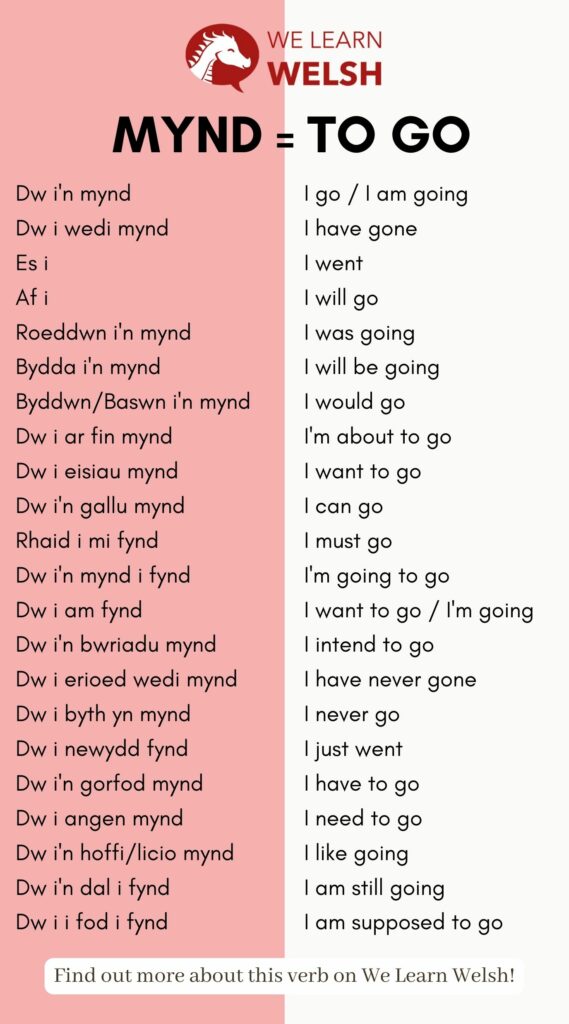“To go” in Welsh is best expressed with the verb mynd (literary form: myned). It is a verb-noun that originates from Middle Welsh mynet and can be traced back to the Proto-Brythonic form *moned.
mynd
to go

Here is how mynd is conjugated in the present tense. Blue indicates the northern variety of Welsh while red indicates the southern variety.
Dw i’n mynd
(R)wyt ti’n mynd
Mae o’n / e’n mynd
Mae hi’n mynd
Dan / Dyn ni’n mynd
Dach / Dych chi’n mynd
Maen nhw’n mynd
I go
You go (singular)
He goes
She goes
We go
You go (plural / formal)
They go
Mynd is most frequently used to describe the physical or figurative movement of someone or something from one place to another. For example:
- Dan ni’n mynd i’r ysgol bob dydd. = We go to school every day.
- Byddi di’n mynd yn bell. = You will go far.
Mae John yn mynd i Gaerdydd heno.
John is going to Cardiff tonight.

In colloquial Welsh, it is common for mynd to describe something that has passed into a specific (usually undesirable) state. When this is the meaning, the best translation is often “to become”.
Mae pethau wedi mynd yn drasig o’i le.
Things have gone terribly wrong.
Mae Dafydd wedi mynd yn grac.
Dafydd has become angry.
As could only be expected from a common verb, mynd has a number of additional meanings beyond “to go.” When combined with the preposition â, it acquires the sense of “to take” (literally “to go with“). Conversely, “to bring” is expressed as “dwad / dod â” (literally “to come with“).
Dw i’n mynd â fo i’r cinema.
I’m taking him to the cinema.
Similar to the English verb “to go,” the Welsh word mynd can describe the passage of time, the act of leaving, and the conclusion of something. In certain contexts, it serves as a euphemistic expression, implying “to die.”
- Lle mae’r amser wedi mynd? = Where has the time gone?
- Aeth o yn sydyn. = He went (died) quickly.
- Ydy hi wedi mynd yn barod? = Has she already gone (left)?
Another similarity Welsh shares with English is that it makes use of the so-called “going-to future” form, where “to be going to” refers to a future occurrence. In Welsh, this form would be mynd + i (a preposition meaning “to” or “for”). For this reason, a phrase like Dw i’n mynd i fynd… (I am going to go…), where mynd is repeated two times, makes perfect sense in both languages!
Dw i’n mynd i wneud e yfory.
I am going to do it tomorrow.

Expressions featuring the verb ‘mynd’:
Mynd o flaen gofid
English meaning: to anticipate/assume the worst, To excessively worry about something when there may not be any difficulties at all
Literal translation: don’t go ahead of distress
Araf deg mae mynd ymhell
English meaning: Slow and steady wins the race
Literal translation: Going far is quite slow
Mae’r hwch yn mynd trwy’r siop
English meaning: The place is going to rack and ruin
Literal translation: The sow is going through the shop
Mynd i’r afael â
English meaning: to come to grips with
Literal translation: to go to grips with

